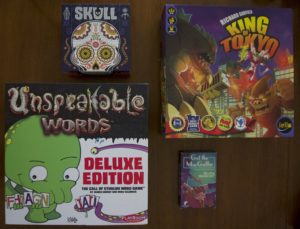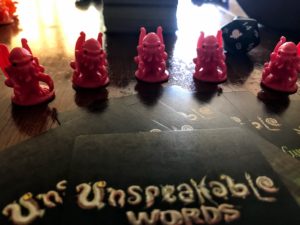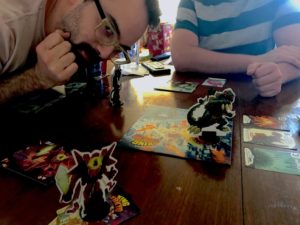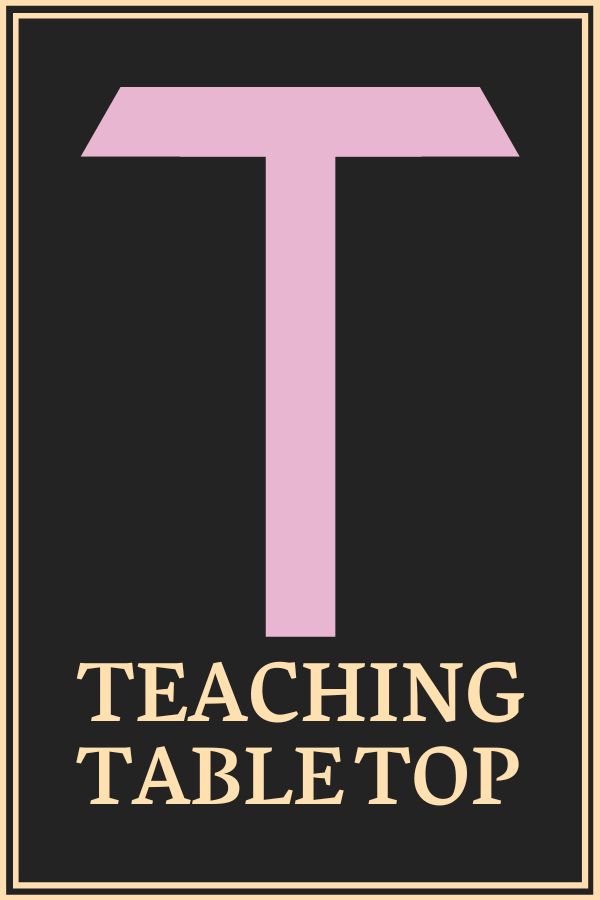I had supposed our first blog entry on Teaching Tabletop would regale readers with the virtues of learning to teach games. Or maybe I would provide a bulleted list of reasons why you should care about how you teach tabletop games. I’ve been told readers like bulleted lists.

But no. Perhaps these will appear in other articles at other times. This entry is a story about an afternoon of gaming illustrating why learning to teach tabletop games well is important and meaningful to us.
Great experiences through great teaching
I’ll start at the end, because the end is what matters: everyone left our gaming session having had a wonderful time, and also wanting to locate and purchase the specific games we played so that they could continue to play them. Better still, a self-proclaimed non-gamer learned there might be some games out there that he might actually enjoy.
I believe that most of this comes down to game teaching. I don’t mean just having a good rules run-through (though this can certainly make or break teaching a game). Even something seemingly mundane such as thoughtful game selection for a specific group is part of teaching tabletop games.
I don’t know what your goals are when you teach a game, but many times our goals are about creating a positive experience. We might want those we are teaching to ask to play that game again another time. Or maybe we hope they will want to learn about other games they don’t yet know about. Still another reason might be to just have a good time and want come back for more of the overall “game night” experience. Our goals are usually similar to these, and like most things achieving them takes work, practice, and a dose of learning from our mistakes.
So about that story…
My brother Gary and his partner Ed visited us this past weekend. Gary and I had been plotting for a few weeks to play some games together. Unbeknownst to me, Ed is generally not all that fond of games. As I was showing some of our games to my brother, I asked him what he thought Ed might enjoy. I quickly realized that the lighter side of gaming would be where we would want to keep things, and based on my description he thought Unspeakable Words might be a good game to start. I wanted to make a good impression with Ed and potentially lead him to an interest in playing more games with Gary, though I still was unaware that on the whole Ed did not like games.
Unspeakable Words

Gary and Ed went out for a walk and Lisa and I cleared the table and set up the game. Anyone who has played Unspeakable Words will realize that “setting up” Unspeakable Words sounds more grandiose than it is. Shuffling a deck of cards, pulling five Cthulhu pawns per person and a twenty-sided die makes for not much set up. But we prepared the game nonetheless. Lisa added a pad and pencil, and I pulled out a few select letter cards for demonstration.
I also dug through the deck and pulled some of the optional cards with special rules so I could point them out. While I don’t normally add in expansions when teaching a new game, for this game the extras add some fun quirks without really complicating anything. I put my example cards on top of the deck so I could teach the game without rifling through the stack.
The Teach
When Gary and Ed returned from their walk, we grabbed some drinks and sat down to play. I opened “the teach” (I’m still trying out this newer slang) with a bit of flavor and a gravity and seriousness inspired by the rule book:
“We are researchers of the arcane, trying to uncover powerful and ancient words…” and so on.
After a brief introduction of the types of words allowed and disallowed, illuminating some light strategies involving the die-roll vs. word-score press-your-luck mechanic, and answering a couple of questions, we started playing.
There were a few of questions that arose during the game. These were mainly the kinds of things that you might expect with most word games. That is to say, which words are legal and what not? Scoring to win the game is also slightly different from scoring throughout the game. A question popped up about this, as well. I’ll keep that in mind for future teaching, and anticipate that it might go unnoticed in the rules runthrough. Maybe reinforce it just before someone is in striking distance.
Platypus Cheese
In short, we all had a lot of fun! I went insane quite quickly (in-game, I’m pretty sure), and we definitely played with the optional rule wherein the researcher who discovers the deepest, most powerful words (ie. the ones you make up), must also define what these words mean. I’m not often one to tell you how to live your life, but you should always be kind to others and always play with this rule. I offer the following as evidence from our second game to support my claim: Lisa discovered the word which she says describes the cheese made from the milk of the platypus. The platypus, of course, excretes milk through its belly skin.
I’ve been unable to source platypus cheese, but that last bit is truly how a platypus provides milk for its young; they do not have teats. Also, researchers are studying the protein structures in the milk to try to understand the powerful antibacterial properties which it hold. This could be important because it could combat highly resistant strains of bacteria which have recently emerged.
https://www.bbc.com/news/newsbeat-43415998
Science! You’re welcome. Also, Lisa told us the cheese is referred to as “qrink.” You’re welcome again.
Other games

For our purposes platypus cheese was just hilariously perfect. We all had a great time, and proceeded to continue through three other games: Get the MacGuffin, King of Tokyo, and Skull. I won’t go through the teach for each of these, but subsequent to each game, I was gauging the interest level of the group, and in particular Ed. Everyone seemed to be having fun, seemed to like each game, and by the end everyone had won at something.

These winners also had agency over their victories. In other words, games were not won or lost solely due to chance, and a win could be, at least in part, attributed to meaningful choices. I’ve found this to be important even beyond teaching. If everything seems too random, win or lose, players don’t have much reason to care.
Admittedly, Get the MacGuffin can feel a little swingy and random, but on the second play-through, players knew what cards were out there that could do crazy things to the game, and tried to prepare for them.

When we finished, everyone left happy. Later, my brother revealed that Ed didn’t really like games, but that these selections were great and they were likely going to purchase a couple of them.
Key points
And that’s it. I couldn’t ask for better outcomes. In future articles, I’ll dig into and unpack a lot of reasons sessions like this are successful. For now, I’ll leave you with a few key points that made this one work for us:
- Preparation
- Understanding audience
- Understanding goals
- Thoughtful selection of games
- Ending high and leaving them wanting more
I guess I bullet-listed you after all. But it’s to help you teach tabletop games well, so I’m okay with that.
If you have had a game night teaching win, or even one that didn’t go so well, please share it in the comments. We’d love to hear your stories!
-Carl & Lisa
Platypus milk: How it could combat superbugs. (2018, March 15). Retrieved February 18, 2019, from https://www.bbc.com/news/newsbeat-43415998
